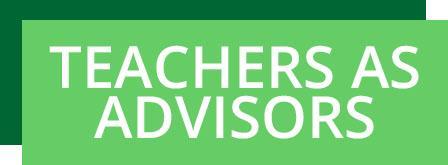A Day at Our Schools
Students learn best when they feel safe and heard.
To create this culture of trust, we put relationship-building at the center of our educational model and organize school days to provide students with ample opportunities to connect with their Advisor, professional mentors, Resilience Specialists, and program staff.

At Big Picture Philadelphia, Advisors, what we call teachers, do more than just teach. In addition to teaching project blocks (our name for core classes), they guide students through their learning by intentionally building strong relationships with their students and their students' families.
When students enroll in our schools, they are paired with an Advisor who matriculates with them through to graduation. Having an adult they know who cares deeply about them and their passions follow them throughout their high school experience helps students build their self-confidence, sense of self-worth, and maintain positive relationships that help them make the best choices for their futures. For many students and families, their Advisor is the central figure in their school experience.
Every school day starts with hot breakfasts in the cafeteria and then students gather in their Advisory for morning circle.

At our schools, we take a project-based approach to learning. This means less emphasis on test-taking and more focus on deeper engagement and end-of-semester presentations of work to ensure mastery of concepts and build confidence.
Our project-based approach builds important academic skills in the sciences, mathematics, and written and oral communications. Project-based learning effectively engages students and empowers them to be active agents of their own learning through the creation of meaningful end products.
For example, instead of a traditional math class, students might have a Financial Literacy Project Block where they learn math skills as well as how to read credit scores, invest money, and more. To show they have mastered their understanding of financial literacy, they would design a project connected to the theme--such as an application for a mortgage loan--and present their project and what they learned to their Advisory at the end of the term.
With a goal of preparing students for real world work, students create personal portfolios that include a resume, cover letter, elevator pitch, references, and more, and participate in mock interviews with regional professionals. Through Real World Learning, students spend time discovering their interests and nurturing their passions through service-learning experiences that allow them to meet with and shadow local professionals.
Internships allow students to gain hands-on workforce experience in a field of their interest. After learning the professional competencies described above, students in upper-level grades attend internships with local organizations and businesses two days per week. This work culminates in special presentations of learning where students work with their mentor to develop and present a project related to their internship.
Internship projects have ranged from organizing an art show with artwork created by Kensington locals to coordinating a conference with local mental health professionals to talk about adolescent mental health issues to developing a business plan for a pop-up shop. The sky is the limit!

Meaningful education isn't just about academic achievement but about social-emotional growth and healing as well. Our five licensed adolescent mental health clinicians, what we call Resilience Specialists, lead regular wellness workshops with students and staff, provide individual and group counseling to students and families, and connect students with needed resources. Their goal is to remove barriers to learning so students can fully engage in their education.

Preparing students for a successful life after high school is at the root of our work. While for many high schools college is the only post-secondary pathway, the Big Picture model is based on the premise that college should be an attainable goal for all students regardless of their prior academic record or financial background but it is not the only or most important path. We have dedicated Post-Secondary and Alumni Counselors at each school that help final year students develop actionable plans rooted in their interests for life after high school--which may include continuing education, full-time employment or technical training, or both.




